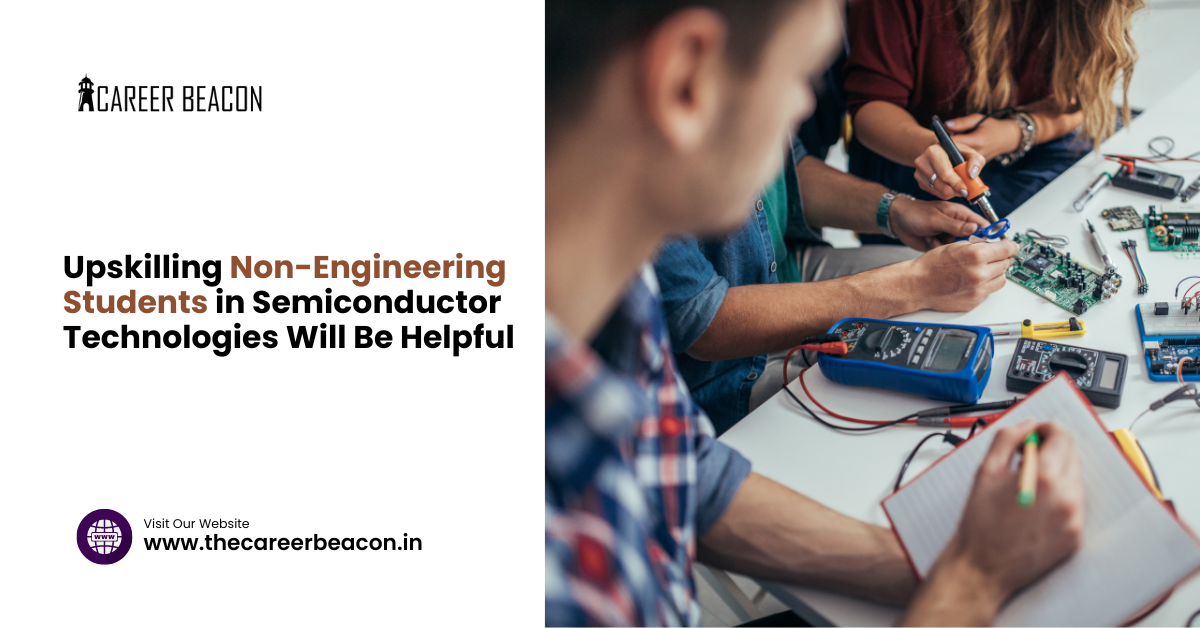
Upskilling non-engineering students in semiconductor technologies will be helpful
In the modern world where technology is changing at a speedy rate, industries are always looking for talent, more so in areas such as semiconductors. Historically, issues related to semiconductor technologies have always been viewed as the engineers’ realm. Nevertheless, due to the enhancements in demand and the enlargement of commerce, non-engineering students must be trained and educated on this aspect. This shift presents a good opportunity for those advising students and students seeking career advice counselling and work coaching to be taken through better lucrative vocation paths into semiconductors.
Importance of Skills Development in Semiconductor Technologies
Semiconductors are one of the most important industries in the present and future of electronics, from mobiles to high-end computers. Participants identified that traditionally engineering students are at the forefront of adopting these technologies, but the studies showed that other students can also contribute significantly to the process. As such, it allows students from different fields of study to acquire specialised skills when venturing into this highly demanded profession, which can be in research, development, marketing, or even product management.
This shift brings new roles for career work coaches and career guidance counsellors to help the students understand and deal with issues related to entry into a technical field without an engineering degree. If these students focus on grabbing better internship opportunities and guided internships, then they can build their careers in this booming domain.
Why Non-Engineering Students?
Engineering students have a different perception of the semiconductor industry as compared to the other non-engineering students. It is pertinent to know that areas like business, economics, statistics, and the humanities can also enhance the tangible aspects of semiconductors. For instance, a marketing specialist with a background in semiconductors can be of great assistance in providing a link between engineering and technology and the customers. In the same manner, a business graduate can look at trends within the business environment and contribute to strategic planning.
It can be trained up or enhanced with the technical knowledge required for such situations to filter through to these students. Thus, regarding career advice counselling, students will be in a position to have insights as to how they can fit into the semiconductor careers based on their strengths. Furthermore, currently, BEP is available for non-engineering students; detailed work coaches can give suggestions and develop the individual development programs to enter this specialised field.
As pointed out above, the major advantages of upskilling in semiconductor technologies include the following:
- Expanding Career Options
These technologies are valuable in various sectors, including consumer electronics, health, automotive, aerospace, and manufacturing industries, among others. Upskilling in this area opens a wide range of career options for non-engineering students, including roles in upskilling in this area, opens a wide range of career options for non-engineering students, including roles in
- Product Management
- Technical Marketing
- Business Development
- Research and Analysis
- Closing Skills Deficit in the Industry
Vendor management in the semiconductor industry has become a problem mainly due to a lack of adequate technical human resources, especially in areas that do not require engineering profession but technical knowledge, such as project management and logistics, among others. Proper training can be made to ensure that the non-engineering students do not have such gaps.
- Enhancing Innovation
The integration of different points of view into the sphere of semiconductors is very helpful in terms of innovations. Engineering students who are also non-engineering students can bring out different perceptions and solutions to technical problems. A mix of technical and non-technical skills can lead to innovative product ideas, business/marketing strategies, and initiating customer relations.
A checklist on how non-engineering students can enhance their skills
Students who are not engineers have certain challenges to face in their bid to transition to semiconductor technologies, as shown below. Career advice counselling and professional work coach can help guide students through the following steps:
- Match skills and interests
In general, non-engineering students need to determine where they stand and how their existing competencies can be incorporated into a semiconductor enterprise. Career advice counselling is useful in helping learners understand their capacities and interests as well as which positions they should apply for within the field.
- Participate in specialised training programs.
Currently, many certification courses and training programs in semiconductors are open for non-engineering students. Some popular options include:
- Elective subjects of the online courses on semiconductor fundamentals
- The seminars include workshops based on new trends in certain types of semiconductors.
- Marketing and product management training boot camps for semiconductors
- Pursue guidance from industry experts
Employing the service of a work coach or mentor can be very useful, especially when the student may lack considerable knowledge on the language used in the industry and when the student is aspiring to land a job in that particular field. It also creates an opportunity to access social relations, which are important in career advancement. Mentorship.
- Build technological know-how in focal areas.
Students who do not take engineering courses should pay more attention to the basics of certain fields, such as the manufacturing of semiconductors, the designing of semiconductors, and the semantics of materials, among others. Nevertheless, in order to be able to work, for instance, in project management, marketing, or as a business development specialist, one needs to have some overall idea of how semiconductors operate.
- Work on industry-specific projects
Practical experience is vital. The non-engineering students should seek an internship, apprenticeship, or industry tie-up for the exposures. The career advice counsellors can help the students find where they should be.
Career advice counselling and professional work coach play a very important role in people’s diet and nourishment.
It’s not simply a matter of acquiring certain technical competencies, be it as a product or a service provider, and then transitioning to the semiconductor technical field; it needs a strategic career move. Career advice counselling plays a critical role in helping non-engineering students navigate this transition by:
- Offering personalised career guidance
- Guiding the students to what academic preparation corresponds to the requirements of the working world
- Helping in writing resumes and portfolios with a focus on semiconductor jobs
Specifically, a professional work coach may help learners with continuous developmental needs for key communicational, managerial, and team functions that are fundamental to any career. They also enable students to make long-term career plans, hence enabling the semiconductor industry to grow in the long run.
Conclusion
Much as the opportunities available for a non-engineering student in the semiconductor industry are enormous, it is prudent to note that specialised upgrading of skills is mandatory. Career advice counselling and professional work coaching are important for students with various levels of education to find themselves and successfully get a job in this profitable and progressive sphere. Through accrediting the specialised training programs, acquiring the technical knowledge, and seeking out mentors, the non-engineering students can also develop a good career in semiconductor technologies as well as grow the future of this industry.
The non-engineering students should then, as the future generation of semiconductors, bring diversity and innovation to the industry by applying their skill set and point of view.


